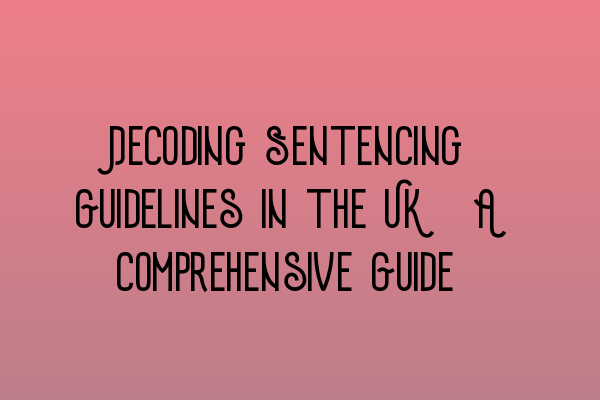Decoding Sentencing Guidelines in the UK: A Comprehensive Guide
As a solicitor practicing criminal law in the UK, understanding the intricacies of sentencing guidelines is of utmost importance. Sentencing guidelines provide a framework for judges and magistrates to ensure consistency and fairness in sentencing. In this comprehensive guide, we will decode the sentencing guidelines in the UK and provide you with the knowledge you need to navigate the complexities of the criminal justice system.
Understanding the Purpose of Sentencing Guidelines
Sentencing guidelines serve the purpose of promoting consistency and transparency in the sentencing process. They provide guidance on the appropriate sentence for different types of offenses, taking into account factors such as the seriousness of the offense, the harm caused, and the culpability of the offender. By following these guidelines, judges and magistrates can ensure that similar offenses receive similar sentences, regardless of the jurisdiction or personal biases.
It is important to note that sentencing guidelines are not mandatory, but they have a persuasive effect on the courts. Judges and magistrates are expected to consider the guidelines when determining the appropriate sentence, but they also have the discretion to deviate from them in exceptional circumstances.
How Sentencing Guidelines are Structured
The Sentencing Council, an independent body in the UK, is responsible for developing and publishing sentencing guidelines. These guidelines are organized into specific offense categories, such as theft, assault, drug offenses, and so on. Within each offense category, there are different levels of seriousness, often referred to as “categories” or “harm levels.”
Each offense category consists of a set of guidelines that outline the factors to consider when determining the appropriate sentence. These factors may include the offender’s previous convictions, their level of cooperation with the investigation, or any mitigating or aggravating factors related to the offense.
Deciphering the Sentencing Process
Understanding the sentencing process is key to decoding the sentencing guidelines. Once an individual is convicted of an offense, whether through a guilty plea or a trial, the court will consider various factors before imposing a sentence.
The first step in the sentencing process is to determine the category or harm level of the offense. This is done by assessing the seriousness of the offense and considering any factors that may increase or decrease its gravity. The guidelines will provide a range of sentences for each category, often expressed in terms of months or years of imprisonment.
After determining the category, the court will then consider any aggravating or mitigating factors that may influence the sentence. Aggravating factors are those that make the offense more serious, while mitigating factors may reduce the severity of the sentence. These factors can include things like premeditation, use of a weapon, or remorse shown by the offender.
Once all the relevant factors have been considered, the court will impose the final sentence. This may involve a custodial sentence, a community order, a fine, or a combination of these measures. The sentence aims to strike a balance between punishment, rehabilitation, and protection of the public.
Staying Up-to-Date with Sentencing Guidelines
Given that sentencing guidelines are subject to periodic review and updates, it is crucial for solicitors and legal professionals to stay up-to-date with the latest developments. The Sentencing Council regularly publishes definitive guidelines, as well as consultation drafts for public comment. By keeping an eye on these updates, you can ensure that your knowledge remains current and that you are adequately prepared to represent your clients in court.
At SQE Criminal Law & Practice Law UK, we understand the importance of staying informed about sentencing guidelines. Our SQE 1 and SQE 2 Preparation Courses provide comprehensive training on all aspects of criminal law, including sentencing guidelines. Whether you are preparing for the SQE exams or seeking to enhance your legal expertise, our courses will equip you with the knowledge and skills you need to excel.
To further enhance your understanding of criminal law and practice, we recommend exploring our related articles:
- SQE 1 Practice Exam Questions
- SQE 1 Practice Mocks FLK1 FLK2
- SQE 2 Preparation Courses
- SQE 1 Preparation Courses
- SRA SQE Exam Dates
By exploring these resources, you can deepen your knowledge of criminal law, improve your exam preparation, and stay informed about the latest exam dates set by the Solicitors Regulation Authority (SRA).
